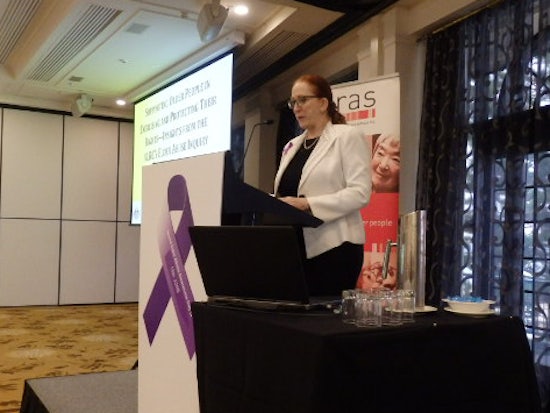Elder abuse recommendations are a catalyst for change
Emeritus Professor Rosalind Croucher, who led the Australian Law Reform Commission (ALRC)’s inquiry into Elder Abuse, believes recommendations from the inquiry are part of the forces driving towards a change in tackling elder abuse, and she encourages organisations and individuals continue lobbying the government for change.

Professor Rosalind Croucher spoke at the World Elder Abuse Awareness Day conference in Adelaide last week (Source: ARAS)
Speaking at the recent World Elder Abuse Awareness Day conference organised by ARAS South Australia last week, Prof Croucher notes in the past there has been a lack of hard data to drive policy, change and persuade government to commit money.
“We’ve procured evidence from a legal policy and the current aged care reviews add more from other perspectives,” she says. “There is a lot of momentum now; sometimes it take a crisis to take the action that will trigger change.”
The ALRC received 458 submissions from research groups, advocacy organisations, aged care providers, community organisations working with seniors and individual submissions – and she says she’s read every one of them. “I feel the pains of sons and daughters who raised a cohort of concerns about aged care, of siblings misusing power of attorney, financial and housing. I acknowledge all of the contributions made,” she says.
Over the past 15 months, the ALRC has reviewed the multiple aspects and complex nature of elder abuse. For instance, there are many areas for jurisdiction. Aged care, superannuation, banking and social security are all under Federal Law Prof Croucher highlights, while property law and home ownership, guardianship, powers of attorney and criminal law are all state. “We can make observation across the whole commonwealth, what the best model could look like and look to state and territory reforms,” she says.
Establishing a serious incidence response scheme overseen by an independent body would include providers reporting on subsequent actions taken. “There needs to be a shift from regulation to response; the current scheme requires a serious incidence to be reported within 24 hours, but there needs to be some discretion as to whether they [the abused] wants the police involved,” she explains. “We’ve suggested providers also need to report what they’ve done.”
She suggests the Aged Care Complaints Commissioner could have a more expanded role and could be the independent body to carry out the scheme.
Staff levels, something which the Australian Nursing and Midwifery Federation has been pushing for, also came under the spotlight, with recommendations for an independent evaluation of research on optimal staffing models and levels in aged care. She believes having data in this area will drive a policy for change and will help the argument for funding.
Other recommendations include a national employment screening process and unregistered aged care workers who provide direct care should be subject to the planned National Code of Conduct for Health Care Workers. “We need to ensure people are attracted into the sector, are having a sense of career progression and wanting to be part of that,” she says.
Prof Croucher says the commonest abusers are children in their 50s, and around 40 per cent is financial abuse. And this can take many forms. For example, she says family agreements for ‘assets for care’ are often informal and a verbal situation of someone living with someone else. “But problems may happen when this breaks down, if for instance, the daughter divorces,” she says.
Recommendations of a national online register of enduring documents could help in this area, however to make this work, Prof Croucher highlights all legislation needs to be in the same language and registration must be cheap, accessible and easy, and privacy issues need to be calibrated.
She believes a national plan with the goals of promoting the autonomy and agenda of older people, addressing ageism and promoting a community understanding of elder abuse and achieving national consistency is the way forward.
“We have drawn together all the ideas and making someone responsible; we now need real leadership, clear principles, goals and actions,” she says.
She believes the recommendations are a distillation of what can be done and make a clear suggestion to the government to ensure all live dignified lives free from elder abuse.
While the ALRC will continue to be involved where relevant, Prof Croucher confirms the implementation of the recommendations is a matter for government. The 43 recommendations are now been considered by Attorney-General, George Brandis.










